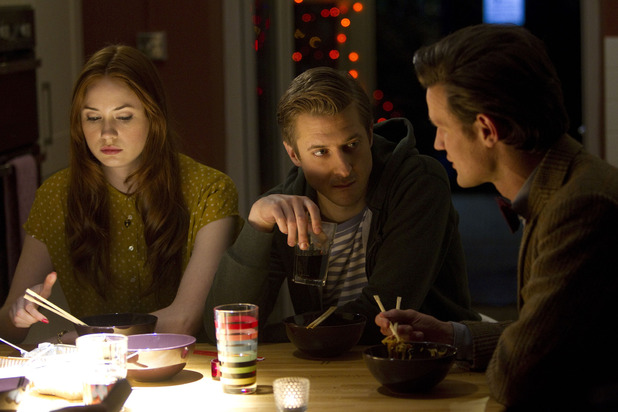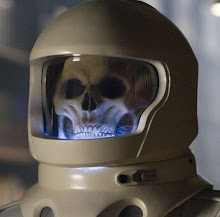The calm before the storm of next week's half-season finale, The Power of Three is a fun, fluffy adventure that struggles with its resolution, but still manages to provide a nostalgic and heartwarming penultimate outing for the Ponds.
As Amy states in the episode's opening narration, this is the story of the time the Doctor came to stay. When millions of small black cubes arrive on Earth overnight, the Doctor moves in with the Ponds to ascertain the exact nature of the inanimate invaders. As time passes and humanity begins to assimilate the cubes into their everyday lives, the Ponds start to wonder if the mystery of the slow invasion will ever be solved...
Perhaps the most enthusiastic investigator of the cubes is Rory's dad, the returning talent of Mark Williams. Last heard from on the Jurassic planet of Siluria in Dinosaurs on a Spaceship's closing moments, Brian lends the episode several of its finer humorous elements - 'Brian's log' being my particular favourite - but he also gets to deliver some very heartfelt lines, the most memorable of which being his closing speech to Amy and Rory. Far from being one-dimensional, or comic relief, Brian has swiftly become a genuinely lovable character, and it's a real shame that this is likely to be the last we see of him. Fortunately, the same cannot be said for Kate Stewart, UNIT's new scientific adviser and one of the highlights of The Power of Three. Jenna Redgrave's performance as the assured, intelligent commander is an absolute joy to watch, and I think it was a very wise move to leave her character open to return. Though she gets a fair amount of screen time, and her history with the Doctor is both touching and punch-the-air cool, she isn't really the main focus of the episode and it would be wonderful to see her return in future UNIT stories, perhaps to flesh out her character a little more.
That isn't to say, though, that any of the eponymous three are anything other than on top form. Matt Smith, Karen Gillan and Arthur Darvill have been sharing the screen for more than two years now, and their innate chemistry continues to make their scenes together sparkle, from eating fish fingers and custard on the couch to the Doctor's impassioned speech about 'running towards things before they flare and fade'. This scene, incidentally, is one of writer Chris Chibnall's highest points - I haven't really been massively fond of his previous works, from 42 to The Hungry Earth and Cold Blood, and more recently Dinosaurs on a Spaceship, but the Doctor and Amy's quiet talk in front of the tower of London here is most certainly his finest contribution to the show. It captures quite brilliantly the depth and soul of their relationship, and it sheds a more optimistic light on one facet of the Doctor's personality - he isn't running away, trying to escape his past; he's running forwards, building the best future for himself and his friends by showing them everything the universe has to offer. This speech, like so many of the tender moments between the Doctor and the Ponds in this story, is only made more moving with the knowledge that next week will see Amy and Rory's final adventure.
Though the characters and performances of this episode were memorable, the story's other main plot - the invasion of the very small cubes - could have been handled a little more deftly. While the initial slow rise of tension as the episode progressed was very well done, and the cubes were actually rather menacing and unnerving by the episode's end, the resolution and reason for them being there was very weak and badly explained. As intriguing a villain as the Shakri was, with the Doctor's mutterings of Gallifreyan myths and 'the pest controllers of the universe', their actual role and motivation was pretty poorly written. Aside from a reference to 'the Tally', a judgement day-esque event (perhaps meant to play on the idea of the 2012 apocalypse?) which they supposedly serve, the Shakri really had no reason to be assaulting the human race. Furthermore, the two grill-mouthed orderlies, working for the Shakri and hiding in the hospital, were equally unexplained; what were they? What purpose did they serve? Were they Shakri themselves, or just minions? Were they alien, robots, something different? Answers never come, which is especially frustrating as there was plenty of spare time to write in some exposition - The Power of Three ran a little short, at around 40 minutes, so it isn't as if they had to cut explanations due to time constraints. In addition, after all the build up involving the cubes, their real purpose is a bit of a let down - after all of their research, investigating every aspect of humanity's strengths and weaknesses, their only purpose was as a weapon, to wipe out the people of Earth. Whether or not the Shakri really needed a whole year to figure out that heart attacks equal dead people is a question that's on shaky ground, and I think perhaps the villain's plot needed to be a little more intelligent and unusual to justify such thorough research via cubes.
But something that bothered me even more than this week's substandard villain was the Doctor's 'reset button'; literally, all the Doctor does to defeat the Shakri, reverse the effects of the cubes and save planet Earth is point the sonic screwdriver at a computer screen and babble. As far as resolutions go, this smacks of a writer who's reached the climax of his script and realised he has nothing to offer for an ending. While it's true that much of Doctor Who's storytelling comes down to technobabble and made-up words, the show almost always surpasses that, skilfully twining the plot threads together in a pattern so intricate that it's easy to look past the gibberish and see the true brilliance of the characters and their actions. This story's ending, however, lacks this quality, and instead seems to have been hastily knotted and held together with a paper clip. It's fortunate, then, that the episode's other ending is far less fumbled and far more enjoyable; after a full year of trying to cope with real life and Doctor life slowly merging, the Ponds finally decide (with a little help from Brian) to go off travelling with the Doctor full-time once more. It's here, with a clever bit of wordplay, that The Power of Three subtly connects its two stories together through its title; the year that the Earth got cubed, and the perfect number for adventuring in time and space. In the final moments of the story, with that last shot of the time-travelling trio framed by the TARDIS (one of many excellent angles in a story laden with smart, kinetic direction), this episode almost feels like a precursor for another set of wondrous adventures with the Ponds, resolving their series arc of losing interest in the Doctor and his travelling and rejoining him on his exploration of the universe. But as we are all only too painfully aware, these happy days for Amy and Rory cannot last forever - the lights are flickering, and the Angels are almost upon them...
If you enjoyed my review of The Power of Three, then please do leave me a comment letting me know what you thought. You can also find me on twitter and tumblr if you like, or read my reviews for the other stories from this series - Asylum of the Daleks, Dinosaurs on a Spaceship and last week's A Town Called Mercy. Last but not least, thank you for reading, and I hope to see you again soon for my review of The Angels Take Manhattan!


No comments:
Post a Comment